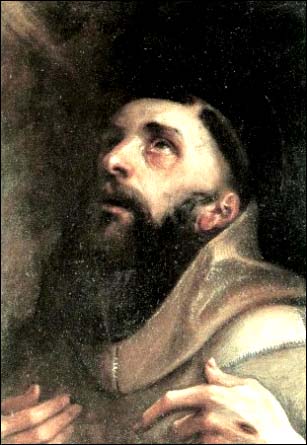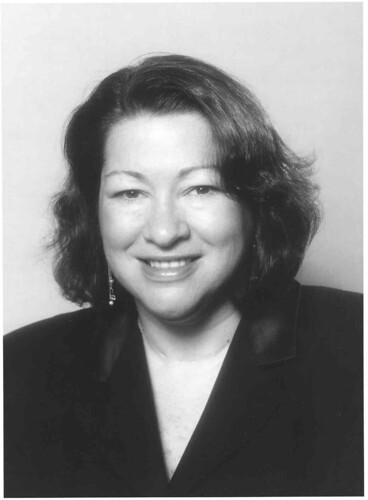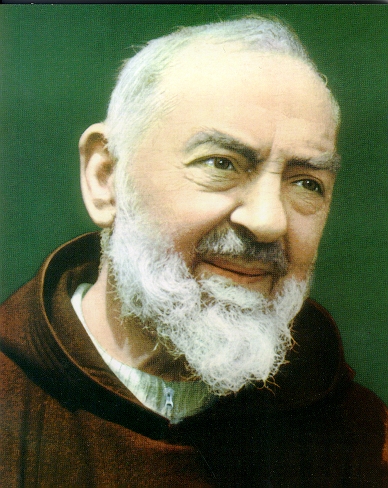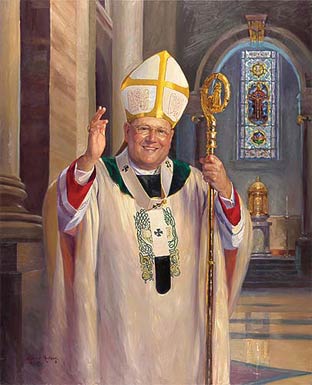
St. Francis of Assisi did not write (or dictate) a great number of documents, letters, and so on that survive. In Francis and Clare: The Complete Works, his writings and sayings fill a scant 166 pages - and that includes editor's introductions and footnotes.
Among the writings he clearly considered important, and which he asked to be written exactly as he dictated them, were the Admonitions. The Admonitions - as the editors of Francis and Clare note, provide "Saint Francis's doctrine on the spiritual life."
The First Admonition - Of the Lord's Body - is the longest one. One translation reads:
The Lord Jesus said to His disciples: "I am the Way, and the Truth, and the Life. No man cometh to the Father, but by Me. If you had known Me you would, without doubt, have known My Father also: and from henceforth you shall know Him, and you have seen Him. Philip saith to Him: Lord, show us the Father, and it is enough for us. Jesus saith to him: Have I been so long a time with you and have you not known Me? Philip, he that seeth Me seeth [My] Father also. How sayest thou, Shew us the Father?" The Father "inhabiteth light inaccessible," and "God is a spirit," and "no man hath seen God at any time." Because God is a spirit, therefore it is only by the spirit He can be seen, for "it is the spirit that quickeneth; the flesh profiteth nothing." For neither is the Son, inasmuch as He is equal to the Father, seen by any one other than by the Father, other than by the Holy Ghost.
Wherefore, all those who saw the Lord Jesus Christ according to humanity and did not see and believe according to the Spirit and the Divinity, that He was the Son of God, were condemned. In like manner, all those who behold the Sacrament of the Body of Christ which is sanctified by the word of the Lord upon the altar by the hands of the priest in the form of bread and wine, and who do not see and believe according to the Spirit and Divinity that It is really the most holy Body and Blood of our Lord Jesus Christ, are condemned, He the Most High having declared it when He said, "This is My Body, and the Blood of the New Testament," and "he that eateth My Flesh and drinketh My Blood hath everlasting life." Wherefore [he who has] the Spirit of the Lord which dwells in His faithful, he it is who receives the most holy Body and Blood of the Lord: all others who do not have this same Spirit and who presume to receive Him, eat and drink judgment to themselves.
Wherefore, "O ye sons of men, how long will you be dull of heart?" Why will you not know the truth and "believe in the Son of God?" Behold daily He humbles Himself as when from His "royal throne" He came into the womb of the Virgin; daily He Himself comes to us with like humility; daily He descends from the bosom of His Father upon the altar in the hands of the priest. And as He appeared in true flesh to the Holy Apostles, so now He shows Himself to us in the sacred Bread; and as they by means of their fleshly eyes saw only His flesh, yet contemplating Him with their spiritual eyes, believed Him to be God, so we, seeing bread and wine with bodily eyes, see and firmly believe it to be His most holy Body and true and living Blood. And in this way our Lord is ever with His faithful, as He Himself says: "Behold I am with you all days, even to the consummation of the world."
As I reread this one, I was reminded of something I heard on a radio show. One person observed that while we talk about the departed Saints who are with Jesus, perhaps with a bit of longing to experience what the Saints are experiencing, we actually are already with Jesus on a regular basis. Every time we are at Mass, every time we receive Communion, we are with Jesus just as fully as the Saints.
Imagine if we acted at Mass exactly as we would act if we were in the presence of Jesus. But then, we are in the presence of Jesus!
Imagine if we focused on that celebration exactly as we would focus on Jesus were He before us. But then, He is before us, in Flesh and Blood, on the altar!
He is with us, as Saint Francis says, "in this way our Lord is ever with his faithful.
Wherefore, all those who saw the Lord Jesus Christ according to humanity and did not see and believe according to the Spirit and the Divinity, that He was the Son of God, were condemned. In like manner, all those who behold the Sacrament of the Body of Christ which is sanctified by the word of the Lord upon the altar by the hands of the priest in the form of bread and wine, and who do not see and believe according to the Spirit and Divinity that It is really the most holy Body and Blood of our Lord Jesus Christ, are condemned, He the Most High having declared it when He said, "This is My Body, and the Blood of the New Testament," and "he that eateth My Flesh and drinketh My Blood hath everlasting life."
... And as He appeared in true flesh to the Holy Apostles, so now He shows Himself to us in the sacred Bread; and as they by means of their fleshly eyes saw only His flesh, yet contemplating Him with their spiritual eyes, believed Him to be God, so we, seeing bread and wine with bodily eyes, see and firmly believe it to be His most holy Body and true and living Blood. And in this way our Lord is ever with His faithful, as He Himself says: "Behold I am with you all days, even to the consummation of the world."
Labels: Mass, Secular Franciscans, St. Francis





 Jealous?
Jealous?


 I was always a Mary Ann guy.
I was always a Mary Ann guy. Of course, some critics claim Gilligan's Island was good for inducing nausea.
Of course, some critics claim Gilligan's Island was good for inducing nausea. Maybe someone should do a study of that.
Maybe someone should do a study of that.

.jpg)







